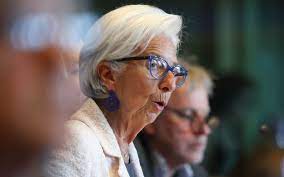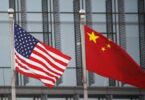Ambrose Evans-Pritchard
The global inflation shock of the last two years is over bar the shouting. Legacy effects will generate much noise for a few months but the one-off spike is reversing almost everywhere with an elegant symmetry. China is sliding into outright deflation as its post-Covid recovery peters out. Wage cuts are spreading in a sureal replay of what happened in Europe and America during the 1930s. Such is the Spartan ethos of Xi Jinping’s ‘common prosperity’ campaign.
The Chinese producer price index has been negative for seven months, and the downward slide is accelerating. The headline CPI inflation rate has already dropped to 0.1pc and will soon be negative. The Shanghai region is at minus 1.1pc already. This has large implications. China remains the workshop of the world, with the scale to shift the global pricing structure. It needs to export its way out of an economic depression and will not hesitate to do so with a cheaper yuan, down 12pc since early 2022. A wave of disinflation is coming our way. Wei Yao from Societe Generale says the regime seems paralysed in the face of a deepening Japan-style trap. “The zero-COVID shock and the housing crash last year seem to have brought China’s implicit government debt stress close to a breaking point. For China to escape a severe deflation scenario, the policy mindset requires a reset. We have seen little willingness so far,” she said.
Land sales for developers underpinned local government budgets during the property bubble. The real estate crash has dried up the revenue, setting off a funding crisis. Forced belt-tightening has neutralised a key instrument used by Beijing to inject stimulus into the economy. Caixin magazine reported last week that the local authorities are drowning under $10 trillion of ‘hidden debt’ that they can no longer fully service. Some are having to cut medical benefits for the elderly. The orthodox (IMF) way out is to wipe the slate clean with root-and-branch restructuring of debts, which is what Japan failed to do in the 1990s, and China is now failing to do, because it is traumatic and runs into powerful vested interests. The central bank (PBOC) is trickling out support but to little avail. It is pushing on a string, to borrow from Keynes. The transmission mechanism is broken.
Chinese economist Cheng Xiaonong says that a pervasive fear of the future has pushed the middle class into “survival” mode. There is a spontaneous “collective action” to withdraw from property, equities, and business investment, leading them to hoard savings and repay loans as fast as they can. This is eroding the interest revenue of the banks and tipping them into a slow death spiral. Shanghai Pudong Bank is slashing wages – by 70pc for one employee (he accepted the cut), a case that went viral on WeChat. Citic is cutting base wages by 15pc. Not even the central bank is spared. This is how great deflations begin. Liu Yuhui from the Chinese Academy of Social Sciences said the country is in the grip of a classic debt-deflation cycle. “People’s willingness to use credit across the entire economic system is rapidly collapsing. It is essentially a balance sheet recession,” he said in a recent speech. Deleveraging is going to be “very bearish and painful.” This is China in mid-2023. It is a country already beginning to export deflation, as you can see in the cut-throat price of electric vehicles arriving in Europe. Chinese firms can produce decent cars for €10,000 less than European rivals. Carlos Tavares from Stellantis says the Europeans are bracing for a “terrible fight”. If you are worried about car inflation, you won’t have to soon.
Chinese goods deflation is hitting a slowing world economy. JP Morgan’s index of input prices for global manufacturing has fallen below the boom-bust line. We learned today that the eurozone has been in recession since the fourth quarter of last year, unlike the UK, which keeps confounding the OECD and the International Monetary Fund. Is there something wrong with their models, one may ask, or their ideology? (I utter not a word beginning with B). Europe’s recession seems to be spreading, sucking in France as property transactions freeze and real consumption hits a brick wall. In its infinite wisdom, the European Central Bank is once again tightening hard after the onset of recession. It has pre-committed to further rate rises in June and July and will no doubt persist for the sake of ‘credibility’. Isabel Schnabel, Germany’s firm hand on the ECB executive board, says it is better to err on the side of being tough. It was that sort of thinking that led to the unforced error of the eurozone debt crisis from 2011-2014. The ECB’s financial stability report last week reads like a Gothic horror story, which I will explore in our next Economic Intelligence newsletter. Suffice to say that broad M3 money has been contracting since September, demand for bank credit has collapsed at rates comparable to 2008, and a credit crunch is underway. The eurozone may find itself uncomfortably close to deflation again within eighteen months.
Which leaves the Anglo-Saxons. There is no evidence of an inflation psychology or a wage-price spiral in the US. None. Inflation expectations five years ahead (5-Y/5-Y forwards) are dead flat at 2.27pc, lower than they were all through the early 2010s when rates were zero. The canonical Blanchard-Bernanke opus on the causes of US pandemic inflation is that the $5 trillion fiscal blitz by Trump and Biden in an economy near full capacity was bound to end badly. They think this one-off “insanity” – to use Olivier Blanchard’s term – has largely played out. Inflation will keep falling mechanically to 4pc without the need for scorched earth policies. Getting below that will be harder. The monetarist view is that war-time expansion of the money supply by the Fed caused the inflation blow-off, and that the process is now going into reverse too violently for safety. Broad M2 money growth has fallen at a record post-war rate of 4.6pc over the last year and this leads the real economy by a year or two. The pace of contraction is likely to quicken as the US Treasury rebuilds its account after the debt-ceiling deal, and the Fed runs down its balance sheet (QT). JP Morgan estimates that they will together drain $1.1 trillion of liquidity from the financial system over the next four months. Most of this will come from bank reserves, risking fresh trouble among struggling regional lenders. Could there be an M2 melt-down by September? Yes, there could. Whatever happens, US inflation is coming down.
The UK may be one of the last inflationary outliers for a month or two, although it is not so different from Germany or Sweden. Global forces will bring it into alignment with the OECD median soon enough. We are not an economic island. Rishi Sunak will have no difficulty cutting inflation to 5pc by the end of the year. Unfortunately this happy development may come hand in hand with our old friend ‘secular stagnation’. Will deflation be the greater worry in 2024 after all?
The Telegraph







